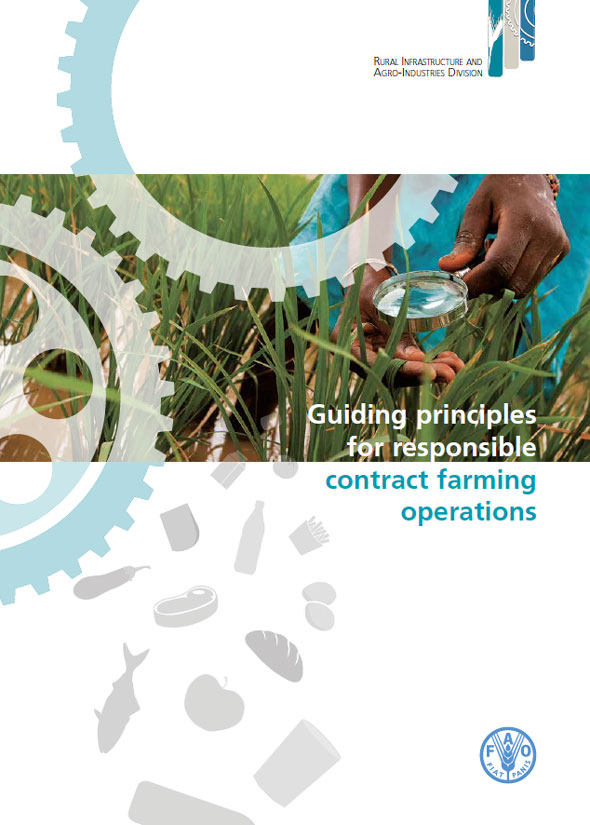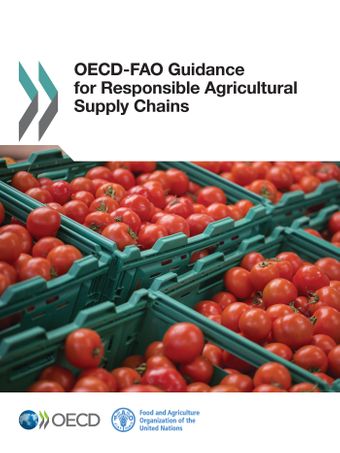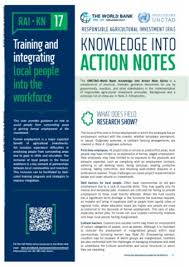Guiding principles for responsible contract farming operations
This document presents a set of guiding principles that promote to responsible contract farming operations. It is intended to serve as guidance for farmers and buyers engaged in contractual relationships, in order to promote good business practices and maintain an atmosphere of trust and respect that is essential if contract farming is to prove effective.
Guidance for Responsible Agricultural Supply Chains
This guide aims to help enterprises observe standards of responsible business conduct and undertake due diligence along agricultural supply chains in order to ensure that their operations contribute to sustainable development. It provides information on
• a model enterprise policy outlining the standards that enterprises should observe to build responsible agricultural supply chains,
African Agribusiness Supplier Development Programme (AASDP) Toolkit - Growing inclusive agri-food value chains benefitting African famers and SMEs
This resource provides tools for companies and buyers to improve responsibility and due diligence along the commodity supply chain, building on the Agribusiness Supplier Development Programme (ASDP). It
• provides a brief introduction of the issues,
• provides an in-depth background on the African agricultural economy and the position of smallholders suppliers, SMEs and business in this,
17 - Training and Integrating Local People into the Workforce - Responsible Agricultural Investment (RAI): Knowledge into Action Notes series
This note is part of an Action Notes series and provides guidance for governments and companies on how to assist people from surrounding areas in gaining formal employment at the investment.
LandAssess Tool, Risk Assessment and Management Framework
The Landassess Tool is a risk assessment and management framework. It provides a clear and simple set of checklists that generate a report to help companies assess and manage how they respect land rights.
Know what drives the adoption of climate-smart agriculture across different scales
Recognizing successful climate-smart agricultural (CSA) practices is not enough for them to be adopted at scale.
At many sites, government or development-led interventions to promote CSA practices face low adoption rates or are not adopted at all.
Data shows that CSA adoption depends on drivers and constraints beyond the CSA practices. Blanket adoption of a specific intervention should never be assumed: the adoption of CSA practices is usually patchy because of many conditions.
Collective action in the irrigation sector of Uzbekistan: a case study of water consumers associations (WCAs) in the Karshi Steppe
Land requirement to feed a productive dairy cow and a healthy family
Farmer participatory research in soil management and varietal selection in Thailand
A pilot project on the use of Farmer Participatory Research (FPR) methodologies with the objective of enhancing farmer adoption of practices that minimize soil erosion in cassava-based cropping systems, was conducted jointly by DOA and DOAE with technical and financial support from CIAT in two sites in Nakhon Ratchasima and Sra Kaew provinces. The activities involved a preliminary survey using RRA methodologies, the setting out of demonstration plots, as well as farmers meetings and farmers field trips to observe the demonstration plots.
CIAT in Africa Roadmap 2017-2020: Four themes for impact
Assessing land suitability for aquifer storage and recharge in northern Ghana using remote sensing and GIS multi-criteria decision analysis technique
Increasing climate variability and challenge in access to water pose major impediments to rainfed agricultural productivity. Extensive flooding of agricultural lands during the rainy season and lack of water during the 8-month long dry season affect the livelihood of the people in the northern Ghana, a situation that calls for better water management practices. The use of aquifer storage and recharge (ASR) based technique, helps to reduce flooding and improve access to water during the dry season; however such technology has specific requirements for successful implementation.







